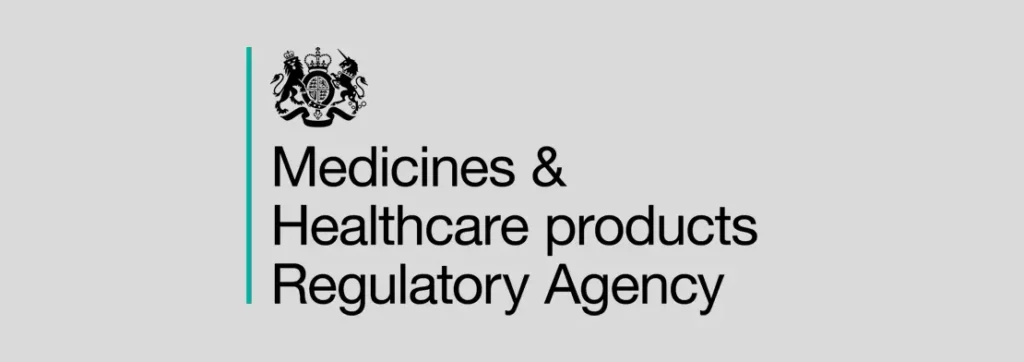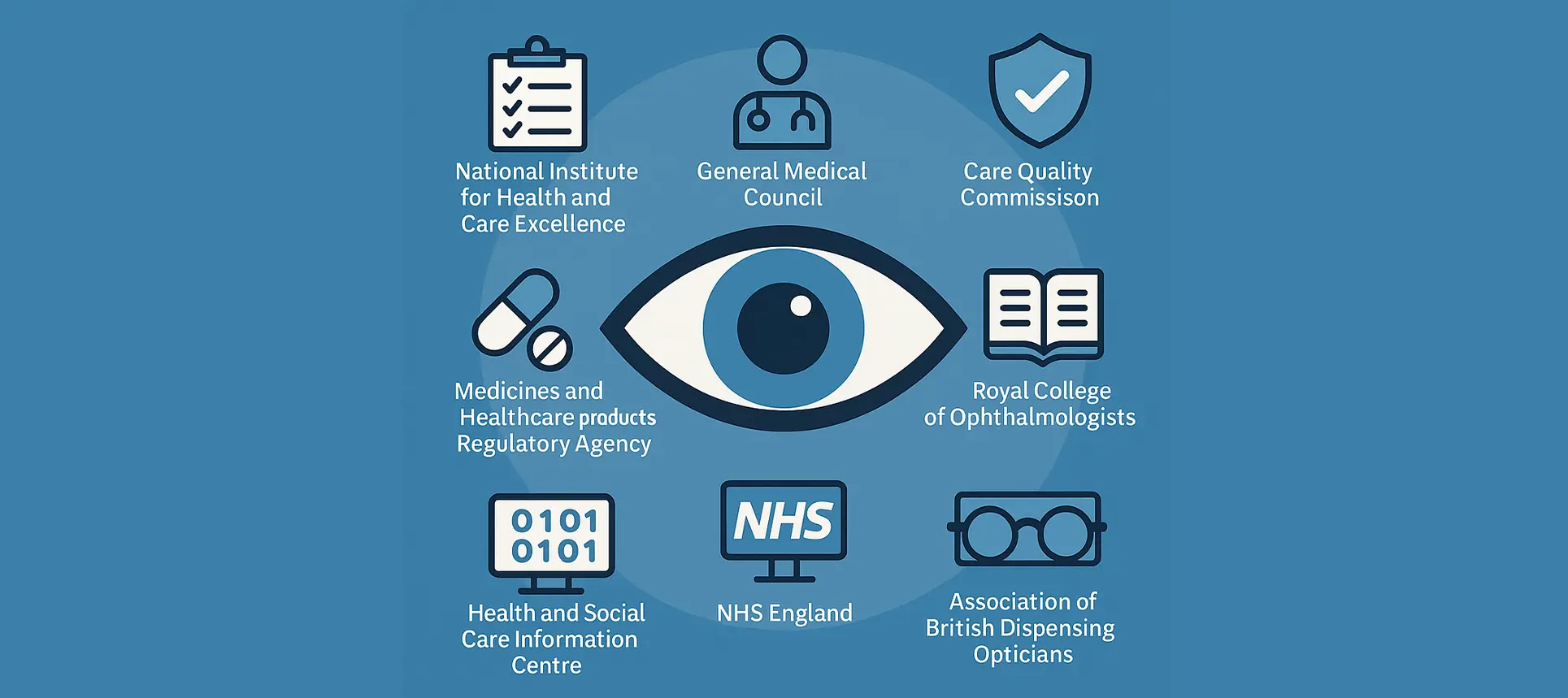If you or someone close to you has been diagnosed with cataracts, you might be wondering who actually oversees the quality of care in the UK. Who sets the standards? Who ensures that cataract surgery is safe, effective and accessible? There’s a whole web of organisations—some government-led, some independent—that play critical roles in everything from developing guidelines and regulating professionals to funding research and shaping policy.
In this article, we’re going to walk through the most important institutional and regulatory bodies that affect cataract care in the UK. We’ll steer clear of individual hospitals or clinics—our focus is firmly on the national picture. And yes, we’ll include direct links to each official website so you can explore them further if you’d like.
1. National Institute for Health and Care Excellence (NICE)

NICE is responsible for issuing guidance on how conditions like cataracts should be managed within the NHS and beyond. It does this by carefully analysing large amounts of clinical evidence and translating that into recommendations that professionals can follow. These aren’t vague suggestions—they form the backbone of what good care should look like across the country. For patients, it means receiving care based on proven best practices.
Their specific cataract guidelines help determine when surgery is necessary, what assessments are appropriate, and how patients should be supported before and after the procedure. NICE also updates its guidance regularly to reflect advances in research and changes in public health priorities. That keeps care in line with the latest science.
Beyond clinical guidance, NICE contributes to shaping national policy by publishing technology appraisals. These cover medical devices like intraocular lenses and consider their cost-effectiveness. If NICE says a new lens offers strong clinical benefit and value for money, it often gets adopted more widely in the NHS.
It’s not just doctors and policymakers who benefit from NICE’s work—patients can access easy-to-understand summaries of the guidelines, too. That transparency helps you take an informed role in your care journey, knowing what to expect and what questions to ask.
2. General Medical Council (GMC)

The GMC licenses doctors in the UK and ensures that they maintain high standards of professionalism and competence. Every doctor who treats you for cataracts—from the one who diagnoses the issue to the one who operates on your eye—must be registered with the GMC. This body holds the authority to set the bar for medical education and ethical behaviour across all specialties, including ophthalmology.
A crucial part of the GMC’s role involves revalidation. This process ensures that doctors stay up-to-date through continuous professional development and regular appraisals. For cataract patients, this means that your care is provided by professionals who are routinely assessed for their skills, knowledge and conduct. It’s a safety net that keeps standards consistent nationwide.
If concerns arise about a doctor’s performance or conduct, the GMC has the power to investigate and take disciplinary action. This can range from providing support and retraining to, in severe cases, removing a doctor from the medical register entirely. That level of oversight is key to maintaining public trust in the healthcare system.
Patients also have a voice in the GMC’s system. If you’ve had a negative experience, you can file a complaint, and the council will assess whether it needs to investigate further. This level of accountability plays a vital role in protecting patient safety, especially in surgical fields like cataract treatment.
3. Care Quality Commission (CQC)

The Care Quality Commission is the independent regulator of health and social care services in England. Its main job is to inspect and rate services—including those that provide cataract surgery—to ensure they meet required standards. Whether it’s an NHS eye clinic or a private laser surgery centre, the CQC checks for safety, effectiveness, and leadership.
When the CQC conducts an inspection, it examines a wide range of factors such as infection control, staff qualifications, waiting times, and patient feedback. These inspections result in public ratings from ‘Outstanding’ to ‘Inadequate,’ helping people make informed choices about where to receive treatment. For cataract patients, this could influence where they decide to have their surgery.
The CQC also has enforcement powers. If a facility falls short, the commission can issue warnings, demand changes, or in extreme cases, shut it down. This not only protects patients but also motivates service providers to uphold high standards of care. Regular audits help maintain ongoing quality, not just one-time performance.
What sets the CQC apart is its patient-focused approach. The organisation encourages service users to share their experiences and uses this feedback to inform its inspections. This bottom-up perspective ensures that care isn’t just clinically sound, but also compassionate and responsive to individual needs.
4. The Royal College of Ophthalmologists (RCOphth)

The Royal College of Ophthalmologists is the professional body dedicated to the education and training of ophthalmologists in the UK. Its influence stretches across all aspects of eye care, including cataract treatment. The College is responsible for setting clinical standards, shaping the curriculum for eye specialists, and issuing guidelines that directly affect how care is delivered.
One of its most essential roles is developing best practice protocols. These cover every aspect of cataract care, from pre-operative assessments to post-operative monitoring. Their documents are used by NHS Trusts, independent clinics, and private consultants to ensure that the care delivered is consistent, safe, and based on the latest evidence.
The RCOphth also oversees examinations for ophthalmologists in training. It helps ensure that only those who meet its rigorous clinical and ethical benchmarks can practice independently. That gives patients confidence in their specialist’s expertise, particularly for procedures like cataract surgery, where precision and experience matter immensely.
In addition, the College serves as a hub for ongoing education. It offers webinars, scientific journals, and conferences to keep professionals current with advancements in surgical techniques, lens technology, and patient care models. This focus on continuous learning ensures that cataract patients benefit from the most modern approaches available.
5. Medicines and Healthcare products Regulatory Agency (MHRA)

The MHRA plays a vital role in overseeing the safety and effectiveness of medical devices and medicines in the UK, including those used in cataract treatment. From the intraocular lenses implanted during surgery to the eye drops prescribed for post-operative care, the MHRA ensures that each product meets rigorous safety standards before reaching patients.
Their work doesn’t stop at initial approval. The MHRA continuously monitors products through systems like the Yellow Card scheme, which allows healthcare professionals and the public to report adverse reactions or device failures. This ongoing surveillance helps protect patients and can lead to safety notices or product recalls if necessary.
The MHRA also plays an important part in evaluating new technologies. As innovations in lens design and surgical instruments emerge, manufacturers must submit detailed evidence to the MHRA to demonstrate both safety and clinical benefit. Only after passing these checks can new devices be introduced into NHS and private cataract procedures.
In essence, the MHRA acts as a gatekeeper, ensuring that only safe, effective, and well-tested products are used in eye care. This protects patients from potential harm while fostering a climate of innovation underpinned by evidence and accountability.
6. Health and Social Care Information Centre (NHS Digital)

NHS Digital, officially known as the Health and Social Care Information Centre, serves as the data backbone of the NHS. It gathers and manages vast amounts of health-related data, including statistics about cataract surgeries. By analysing this information, NHS Digital helps healthcare providers understand patient outcomes, waiting times, and demographic patterns.
This information isn’t just collected for curiosity’s sake—it’s used to make critical decisions. If data shows that certain areas have disproportionately long cataract surgery waiting lists, it can prompt NHS England to adjust funding or resources. That makes NHS Digital’s work foundational to service improvement and policy change.
Patients benefit directly from this too. Data from national audits can reveal trends in complications or success rates, pushing providers to improve. And anonymised statistics help researchers refine surgical techniques or find ways to offer better pre- and post-operative care for cataract patients.
Furthermore, NHS Digital plays a crucial role in protecting patient privacy. While it holds an immense amount of sensitive health data, it adheres strictly to data protection laws and anonymisation practices. You can rest assured that your information is being used ethically to improve care across the board.
7. NHS England

NHS England is the national body that oversees the planning and commissioning of NHS services. When it comes to cataracts, they’re responsible for ensuring services are accessible, consistent, and based on clinical need. Their influence reaches into every region of the country, affecting how and where cataract surgery is delivered.
They work closely with Integrated Care Systems (ICSs), which are regional bodies designed to tailor services to local populations. By aligning national goals with local needs, NHS England helps ensure that cataract services are available to those who need them most, regardless of where they live.
Another major role of NHS England is monitoring performance through benchmarking and quality indicators. For cataracts, this might include evaluating how long patients wait for surgery or the rate of post-operative complications. If standards are slipping in certain areas, NHS England can take steps to address the issues.
NHS England also oversees funding, making strategic decisions about resource allocation. When you’re booked for cataract surgery, it’s often because NHS England has approved and funded the local services that make it possible. It’s a powerful but often behind-the-scenes player in your care pathway.
8. Health Education England (HEE)

Health Education England is responsible for training and developing the NHS workforce. It ensures that new ophthalmologists are properly educated and that current eye care professionals continue to grow their skills. In the context of cataract treatment, this means providing the foundation for safe and effective surgery across the country.
HEE supports structured training pathways in ophthalmology, from early career stages to specialised cataract surgery roles. They work with the Royal College of Ophthalmologists to ensure training programmes align with clinical standards and patient needs. This keeps learning outcomes relevant and up to date.
In addition to initial education, HEE funds a range of continuing professional development (CPD) opportunities. These help professionals keep up with technological advances, new surgical techniques, and emerging best practices. For patients, this translates into better care and more informed clinicians.
HEE’s work has long-term impact. By building a well-trained and adaptable workforce, it helps future-proof the NHS’s ability to provide quality cataract care. It ensures that the skills and capacity needed to meet growing demand are always in development.
9. National Screening Committee (UK NSC)

The UK National Screening Committee plays a slightly different role compared to others on this list. While cataracts aren’t currently part of a national screening programme, the NSC is tasked with assessing whether conditions should be included based on evidence, cost-effectiveness, and benefit to the population.
Even though they don’t yet recommend routine screening for cataracts, they keep an eye on emerging research. If evidence shows that screening could significantly improve outcomes—perhaps by identifying cataracts earlier or preventing complications—they might advise introducing it in future.
Their decision-making process is highly rigorous. It involves extensive reviews of scientific literature, consultations with experts, and public health evaluations. This ensures that any screening recommendations are backed by solid evidence and practical feasibility.
So while the UK NSC may not directly impact your cataract journey today, their behind-the-scenes work is essential. They help ensure that NHS screening programmes focus on interventions that offer real benefit without unnecessary cost or overdiagnosis.
10. Association of British Dispensing Opticians (ABDO)

The ABDO supports and regulates dispensing opticians—professionals you may first encounter during a routine eye test. While they don’t perform surgeries, they often spot the early signs of cataracts and play a key role in your referral to an ophthalmologist.
ABDO ensures that these professionals are trained to a high standard, particularly in detecting symptoms and guiding patients through their next steps. They provide continuous education opportunities, helping dispensing opticians remain knowledgeable about the signs, symptoms, and implications of cataracts.
Public education is also a part of ABDO’s mission. They provide resources and guidance to help people understand their eye health and recognise when to seek further care. That makes them a first line of defence against delayed diagnosis and treatment.
In short, ABDO may operate a bit more quietly compared to the big regulatory bodies, but their influence on the patient journey is significant. They bridge the gap between the public and specialised ophthalmic services, ensuring early intervention and timely referrals.
Final Thoughts
Navigating cataract care in the UK might feel overwhelming, but it helps to know who’s behind the scenes making sure everything runs smoothly. From the GMC that regulates your doctor, to the MHRA that checks the safety of your lens implant, a whole network of institutions is working in tandem to ensure you receive high-quality care.
Understanding who does what can also empower you as a patient. If you ever feel uncertain about your treatment or want to dig deeper into the policies guiding your care, these are the organisations to look at. They’re here to ensure your sight—and your safety—are always top priority.

